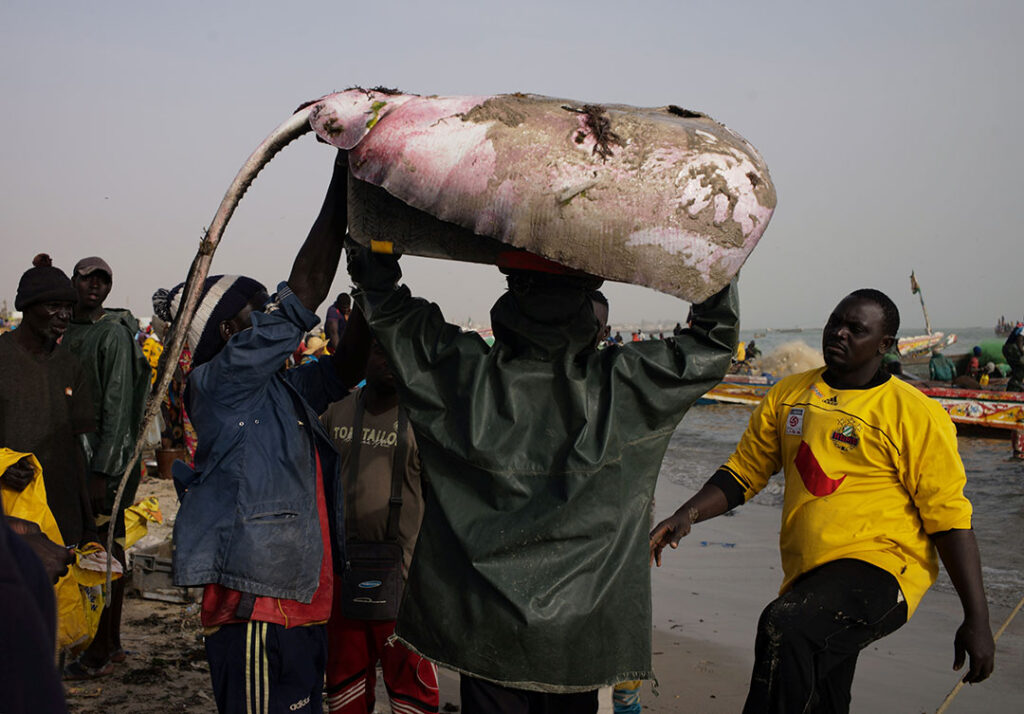ADF STAFF
The captain of a Senegalese fishing canoe suffered serious burns recently after he confronted the crew of a Chinese trawler sailing aggressively in the Gulf of Guinea.
Maguette Mbaye, 36, told Gambian authorities he was at the helm of an 11-person boat off The Gambia’s coast when a large Chinese trawler tried to capsize the canoe on Sept. 19. Mbaye said he was attacked when he boarded the Chinese vessel “to question them about the dangerous maneuvers carried out against my canoe,” according to Gambian government spokesperson Ebrima G. Sankareh.
“Before I could finish speaking, a shower of blows descended on me,” said Mbaye, a married father of three children from Mbour, a port city in southern Senegal. “Then they sprayed me with gasoline and burned me,” he added, according to a report on seneweb.com. Photos of Mbaye show severe burn injuries the length of his right arm.
He was attacked in waters off Mbour. Mbaye asked his crew to take him to The Gambia for medical treatment, authorities said.
Gambian authorities said the Chinese vessel operated with a Senegalese fishing license and that the incident occurred in Senegalese waters. Alioune Ndoye, The Gambia’s minister of fisheries, said he was consulting with Senegalese authorities before the canoe’s crew returned home.
Such aggressive acts by Chinese trawlers stoke fears in West African communities that have relied on fishing for food and income for generations. The United Nations estimates that 600,000 Senegalese depend on fishing-related jobs.
In Mauritania, Senegal’s northern neighbor, artisanal fishermen called for the removal of Chinese trawlers from its waters in early September when a large Chinese boat was accused of deliberately striking a local fishing boat, killing three Mauritanians. The Chinese trawler had turned off its lights and automatic identification system while fishing in an area reserved for artisanal fishermen in the early morning darkness. The Chinese captain was later detained.
Peter Hammarstedt, director of campaigns for Sea Shepherd, a nonprofit organization that works to eliminate illegal fishing, told ADF that he has spoken to artisanal fishermen in Liberia whose pirogues and canoes were rammed and sometimes sunk by foreign industrial trawlers.
“People do drown,” Hammarstedt said.
In West Africa and beyond, China’s distant-water trawlers decimate native fish stocks by using huge nets capable of catching tons of fish per day — far beyond the capacity of local fishing boats — often in prohibited zones, among other illegal practices.
The incident involving Mbaye’s canoe came as Senegal’s artisanal fishing industry protested the licensing of three Chinese vessels amid lockdown measures to contain the spread of COVID-19. The Chinese trawlers were caught illegally fishing in Djibouti in 2017.
Depleting fish stocks add to the anxiety of local fishermen. Up to 90% of Senegal’s fisheries are fully fished or near collapse, according to the United Nations. The fish are mostly exported to Asia and Europe, routinely as fishmeal or fish oil produced in factories that destroy local ecosystems.
Senegal’s fishing industry was reeling from COVID-19 long before Mbaye was burned at sea.
Galay Sarr, a Senegalese fisherman, told Deutsche-Welle that he made a decent living as a fish exporter until virus lockdown measures crippled European markets.
“We would usually export our fish to Italy, but because of coronavirus all the flights were canceled so we couldn’t send them,” Sarr said. “Some months I earned so much I was able to save 150 euros. These days it’s hard just setting aside 30 euros to live off. We can’t even sell to factories anymore, and that’s how me made our profit. Now, we buy fish from the fishermen and just have to store it.”

